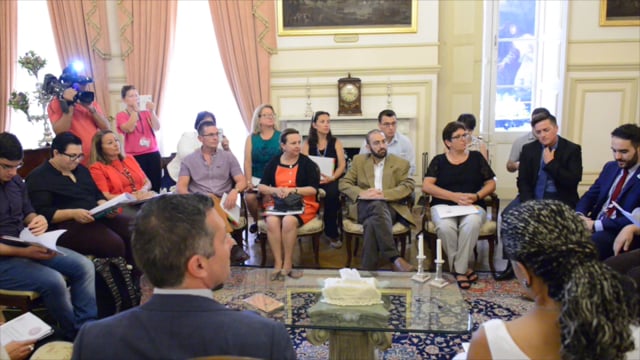[WATCH] Even US moving towards ban on gay conversion therapy
‘Stressing human factor the only way to ensure long-term change,’ US LGBT envoy says


Instilling acceptance in the more long-term, and social and cultural aspects are the hardest challenge the LGBTI community has to face, according to the US State Department’s Special Envoy for the Human Rights of LGBTI persons, Randy Berry, who has had a consultation with NGOs on the developments within the community in Malta.
“The only way to ensure this long-term change is through a stress of the human factor. It’s important to put a human face to the issue to hammer it home that this is not a theoretical issue, but a reality that affects our sons, daughters, brothers, sisters, relatives and neighbours alike.”
In an interview with MaltaToday, Berry said that leadership of governments, civil society, cultural sectors and even the media could play a substantial role in encouraging this view of universality.
“The members of this community have always been and will always be present. It’s our job to encourage a more long term embrace of the members of this community,” he said.
Berry added that Malta presented a unique reality due to its considerably smaller population.
“The sheer size of the population allows for an intersection between personal knowledge and the human aspect,” he said, adding that the situation became more challenging and confusing in bigger populations. He added that he was however confident that the change, however gradual, would indeed take place on a global scale.
Asked whether it was more effective to target policies before focusing on changing the social aspect, Berry explained that he believed it was possible to work on multiple tracks rather than focus solely on one approach.
“That is in fact the kind of approach that will be visible on an international scale,” he said, outlining international efforts to introduce laws that protect and embrace equal rights of citizens irrespective of their sexuality, and even battle the criminalisation of same sex behaviour in some countries.
“We are simultaneously working on engaging in discussions with communities of faith and even business. Both these particular groups can essentially influence inclusiveness for LGBT groups.”
Discussing religious communities, Berry maintained that he was sure the vast majority did not condone the idea of ‘conversion therapies’ that held homosexuality as a curable disease.
“I believe in freedom of expression and in people’s freedom to believe what they desire, no matter how much I disagree and believe the perspective may be harmful, ” he said referring to the controversial claims made by Tom Brown, a US Evangelist and founder of the Word of Life church in Texas, who recently visited Malta and defended the idea of conversion therapy.
“Scientific authorities will explain just how harmful this stand can be, and in fact the US government is currently moving towards a ban on the practice of such therapies, particularly on minors.”
Berry was appointed the US State Department’s Special Envoy for the Human Rights of LGBTI persons last April and he professed a special interest in the subject because of his concern for young people from the community.
“The burden of feeling different at an age where people are facing the uncertainty that teenage years would normally bring with them, is only augmented by the challenges society presents to LGBTIQ persons,” he said.
“I have seen far too many examples of young people losing hope and faith in life due to their perceived difference.”
He added that as a married, gay father of two himself, he feels that his current position is a very tangible and unique opportunity to do something meaningful in creating a more accepting future for his children.
Berry also said that Malta presented an admirable and exemplary approach in its attitude towards embracing all members of the community.
“I was struck by the country’s political structure and the progressivism of civil society in its interactions with the leadership of the country.”
He continued by praising Malta’s treatment of themes like family and LGBT as harmonious rather than dissonant themes.
“Through my travels so far, Malta is the most exemplary country in this respect,” Berry said.
Berry also said that Malta had become particularly attractive for LGBT tourism because of its tolerance and embracing of the community.
“As a family man, I can say that I will definitely come back to Malta as I feel that it is a country that really does follow through on its values.”






.jpg)
















